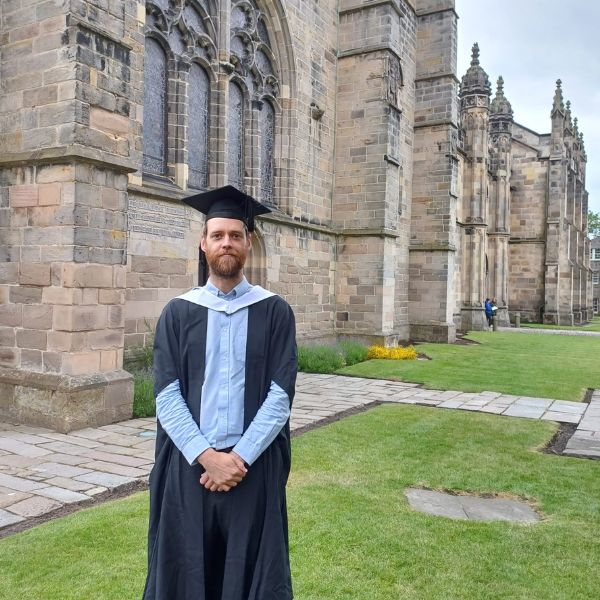Simon Gall

The MLitt in Ethnology and Folklore is unique in the UK. Through a wide variety of teaching contexts including seminars, field trips, guest lectures, and workshops, students gain a broad and in-depth understanding of the disciplines of Ethnology, Folklore, and Ethnomusicology. These disciplines are built on the study of culture in context and they use ethnographic methodologies to explore how people create meaning and shape the world around them through shared creative culture.
Through case studies of Scottish and international materials, the course will show how disciplinary concepts can be used to investigate important issues in contemporary society. Through a wide range of practical and theoretical training, graduates from a variety of backgrounds will gain a sound knowledge of the concepts, skills, and methodologies of the disciplines. Assessments, including essays, ethnographic reports, podcasts, and films, will ensure students are prepared for professional or academic work, including doctoral research, after graduation.
This course, which is prescribed for all taught postgraduate students, is studied entirely online, takes approximately 5-6 hours to complete and can be taken in one sitting, or spread across a number of weeks.
Topics include orientation overview, equality and diversity, health, safety and cyber security and how to make the most of your time at university in relation to careers and employability.
Successful completion of this course will be recorded on your Enhanced Transcript as ‘Achieved’.
30 Credit Points
This course introduces students to key elements in the study of Ethnology and Folklore.
30 Credit Points
This course is divided into three strands: ‘Perspectives on Tradition’, ‘Perspectives on Identity’, and ‘Perspectives on Fieldwork’. These three strands come together to show how concepts from the disciplines of Ethnology and Folklore may be theoretically and practically applied to contemporary society.
30 Credit Points
This course examines many of the principal oral genres historically studied in the disciplines of Ethnology and Folklore through seminars and guest-artist performances.
30 Credit Points
This course explores contemporary issues in Ethnology, Folklore, and Ethnomusicology from a Scottish perspective.
60 Credit Points
This is a substantial, fieldwork based, analytical research dissertation of 20,000 words, excluding endnotes, bibliography, and appendices. Students will consult with the appropriate course tutor(s) in choosing the subject area for a dissertation before the beginning of the study period.
We will endeavour to make all course options available. However, these may be subject to change - see our Student Terms and Conditions page.
| Fee category | Cost |
|---|---|
| EU / International students | £23,800 |
| Tuition Fees for 2024/25 Academic Year | |
| UK | £11,100 |
| Tuition Fees for 2024/25 Academic Year |
The James Carnegie maintenance scholarship for postgraduate students is available with this degree.
Self-funded international students enrolling on postgraduate taught (PGT) programmes will receive one of our Aberdeen Global Scholarships, ranging from £3,000 to £8,000, depending on your domicile country. Learn more about the Aberdeen Global Scholarships here.
To see our full range of scholarships, visit our Funding Database.
By course work, by written examinations, or by a combination of these, as prescribed for each course, and by submission of a dissertation (MLitt candidates only). The degree of MLitt shall not be awarded to a candidate who fails to achieve a CGS Grade of D3 or above in EF 5901, irrespective of their performance in other courses.
The information below is provided as a guide only and does not guarantee entry to the University of Aberdeen.
Normally a good undergraduate degree in a humanities or social science subject.
References are not required in order for applicants to submit an application. They are not usually required in order for a decision to be made but in certain cases applicants may be asked to provide a single academic reference at the request of the academic selector.
Please enter your country to view country-specific entry requirements.
To study for a Postgraduate Taught degree at the University of Aberdeen it is essential that you can speak, understand, read, and write English fluently. The minimum requirements for this degree are as follows:
IELTS Academic:
OVERALL - 6.5 with: Listening - 5.5; Reading - 6.0; Speaking - 5.5; Writing - 6.0
TOEFL iBT:
OVERALL - 90 with: Listening - 17; Reading - 21; Speaking - 20; Writing - 21
PTE Academic:
OVERALL - 62 with: Listening - 59; Reading - 59; Speaking - 59; Writing - 59
Cambridge English B2 First, C1 Advanced or C2 Proficiency:
OVERALL - 176 with: Listening - 162; Reading - 169; Speaking - 162; Writing - 169
Read more about specific English Language requirements here.
You will be required to supply the following documentation with your application as proof you meet the entry requirements of this degree programme. If you have not yet completed your current programme of study, then you can still apply and you can provide your Degree Certificate at a later date.
Eligible self-funded postgraduate taught (PGT) students will receive the Aberdeen Global Scholarship. Explore our Global Scholarships, including eligibility details, on our dedicated page.
Aberdeen Global ScholarshipsThere are many opportunities at the University of Aberdeen to develop your knowledge, gain experience and build a competitive set of skills to enhance your employability. This is essential for your future career success. The Careers and Employability Service can help you to plan your career and support your choices throughout your time with us, from first to final year – and beyond.
You will be taught by a range of experts including professors, lecturers, teaching fellows and postgraduate tutors. However, these may be subject to change - see our Student Terms and Conditions page.